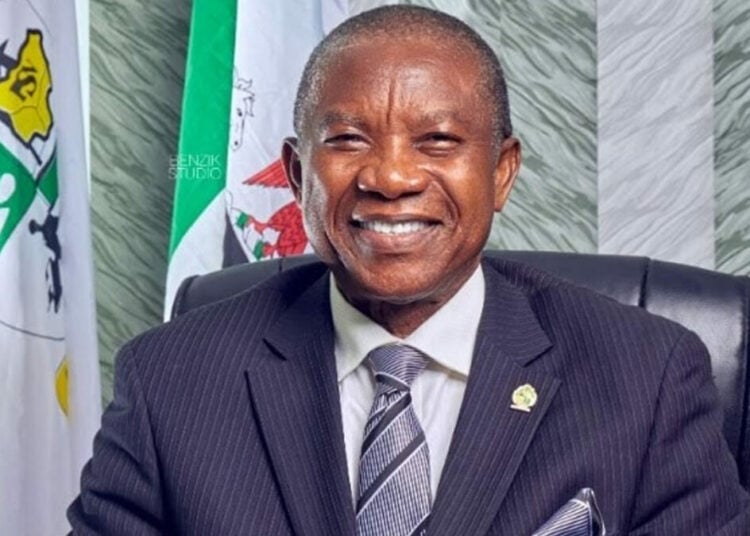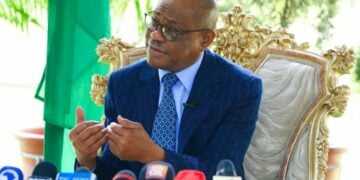President, Association of Corporate Governance Professionals of Nigeria and former President of the Nigerian Economic Summit Group (NESG), Mazi Sam Ohuabunwa, has said that Africa’s slow pace of development is rooted in corrupt and rigid power systems that reward manipulation, greed, and mediocrity over competence and integrity.
Delivering the keynote address at the Innovate Africa Conference 2025 in Abuja, titled “Metamorphosis of Power: Reimagining Leadership Competencies for Africa’s Investment Future,” Ohuabunwa lamented that the continent’s brand of politics often produces leaders through fraudulent elections, bribery, and coercion rather than merit and vision.
He noted that many African leaders emerge from divisive and violent struggles for power, resulting in governance that serves personal or clique interests instead of the common good.
“Political power in many African nations is no longer earned through service or vision,” he said. “It is bought with bribes, secured by subterfuge, or sustained by manipulation. Governance has become a private enterprise where offices are shared as rewards for those who financed election heists.”
The former NESG chairman stressed that the consequence of such leadership is chronic underdevelopment, weak institutions, and poor investment climates.
He argued that Africa cannot eliminate poverty or attract meaningful investments unless it undergoes a “power metamorphosis” — a fundamental rethinking of how leaders are chosen and how power is exercised.
Ohuabunwa explained that “power metamorphosis” entails a shift from rigid, hierarchical, and centralized systems to inclusive, participatory, and merit-based leadership models. According to him, such a transformation would empower citizens, strengthen governance, and create a fairer and more prosperous society.
He urged African countries to overhaul their leadership recruitment processes by prioritizing competence, character, and capacity.
He also restated his long-held view that aspiring public officers should possess at least 24 core leadership competencies — including sound education, emotional intelligence, integrity, accountability, teamwork, and the ability to translate ideas into measurable results.
“Leadership is not for dullards or bullies,” Ohuabunwa said. “We must recruit leaders who are visionary, intelligent, selfless, and ready to make sacrifices for the common good.”
He called for urgent reforms to reduce the influence of money in politics, discourage gerontocracy, and encourage the rise of young, digitally skilled, and forward-thinking leaders across the continent.
“Africa must stop recycling power mongers and begin recruiting competent leaders,” he declared. “Only then can we attract the investments and innovation needed to drive real transformation.”
Ohuabunwa concluded that nations rise or fall on the quality of their leadership, warning that unless Africa redefines power and governance, it will remain stuck in cycles of poverty and political decay.
“We must begin to see power not as an instrument of personal gain but as a sacred trust for national development,” he said. “That is the only path to Africa’s renaissance.”
On her part, President and Founder of Innovate Africa Corporation, Uloma Onyebuchi, has called on African leaders, innovators, and development partners to embrace home-grown solutions as the foundation for the continent’s transformation.
Onyebuchi said the time had come for Africans to take ownership of their development narrative through collaboration, visionary leadership, and innovation tailored to the continent’s unique realities.
“Africa’s development story must be written by Africans themselves,” she declared. “Sustainable development starts from within — with governance that inspires trust, technology that connects us, and leadership that empowers communities.”
Onyebuchi described Innovate Africa as more than an annual gathering of ideas, but a movement aimed at inspiring bold thinking, building partnerships, and challenging outdated systems that hinder Africa’s progress.
“This isn’t just another event,” she told delegates. “It’s a movement that celebrates African excellence, amplifies local innovation, and challenges us to think boldly about the future we are building together.”
She noted that Africa’s path to prosperity lies in structural transformation — through diversification of economies, investment in human capital, digital technology, and creative industries — all driven by collaborative leadership.
“From economic diversification and digital innovation to creative tourism, health, and security, every conversation we have here is about sparking dialogue and driving action,” Onyebuchi said. “Because Africa’s progress isn’t a distant dream; it’s unfolding in real time.”
Urging participants to connect intentionally and think courageously, she said the conference’s goal was to build bridges across sectors, countries, and generations.
“The future of Africa depends on our ability to collaborate — to turn ideas into impact and innovation into purpose,” she added. “Let’s make today a celebration of Africa’s potential and a reminder that the future truly begins here,” he said.




